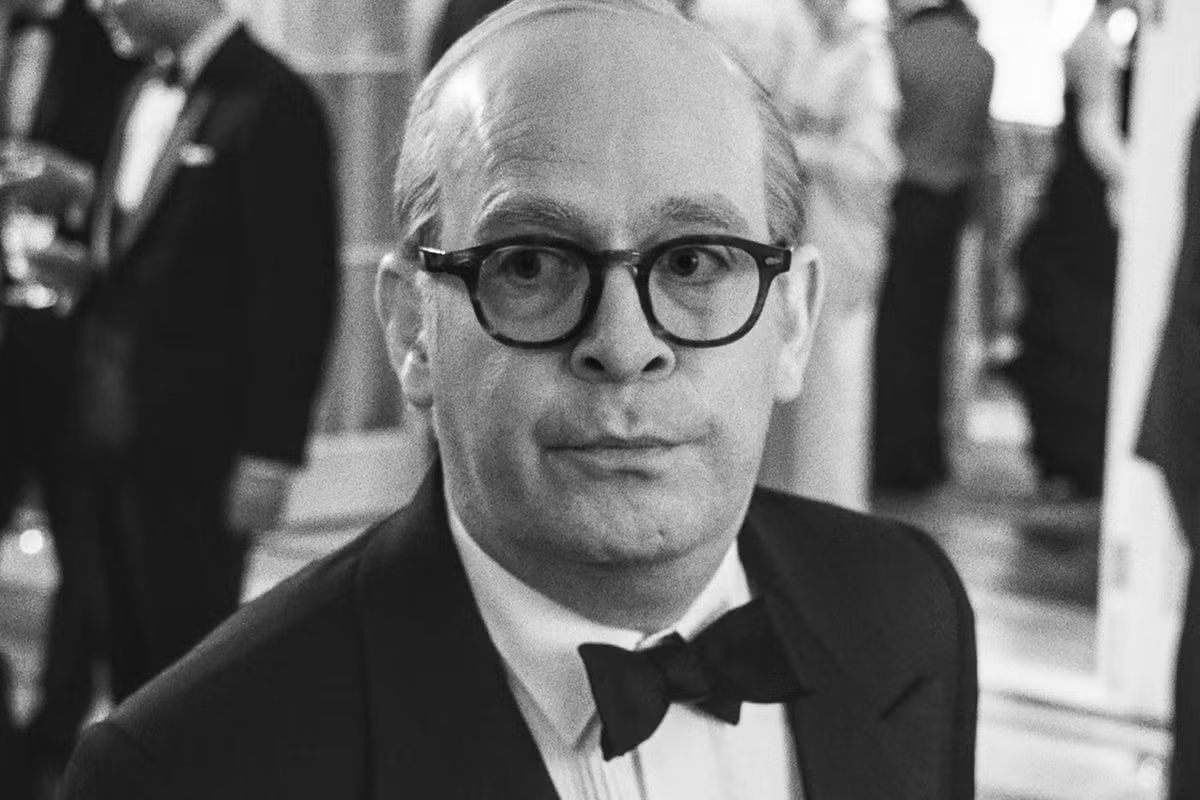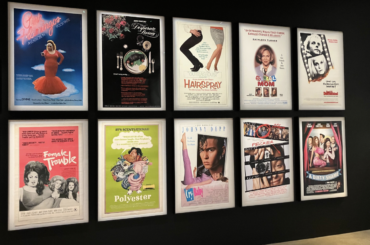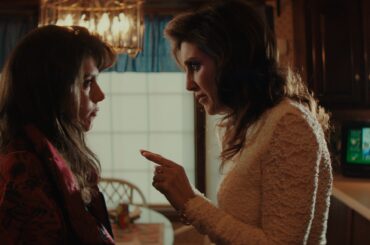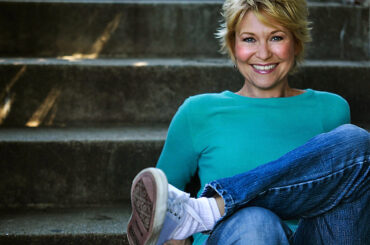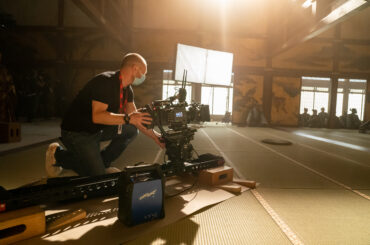Feud: Capote Vs. The Swans is a world of literary, boozy excess. Characters are characters, New York City is a depressing playground, and the style is next level. Season two of Feud slips and slides from dreamy to nightmarish. Composer Julia Newman captures the fantastical, sometimes tantalizing and heavy weight of the upper-class hellscape with her score.
Newman gets under the audience and characters’ skin with melody.
Feud: Capote Vs. The Swans marked Newman’s first series. After her full score captured a wide array of high and low emotions, she’s again working with Feud creator, Ryan Murphy, on another series. Meanwhile, she continues to garner acclaim for her Capote Vs. The Swans score, which she recently discussed with Immersive Media.
[Note: This interview has been edited for clarity and length]
What themes did you want to wrap up with the final episode?
The very last scene really got me—Truman Capote’s ashes sold at auction in Los Angeles. It really puts into perspective for me that even the icons among us don’t always have a glamorous ending. You see the women, the apparition of these women dressed in their gowns at the back of the auction house, looking at people in their flip-flops, watching a world that was once so familiar to them, a world that they dominated, totally foreign to them.
There’s this alienation juxtaposed with a sense of familiarity of Truman going home with his swans, of them kind of walking into the light with one another. So, that was a really interesting aspect of it for me. Also, as I titled the final cue, “Everything Ends” — the things that are familiar to us, the things that we know, the beautiful experiences, the terrible experiences — it all ends.
On that note, the score doesn’t try to suggest hope when there’s none there. Did you just want to fully accept or embrace the misery?
Oh, I think you measure that. You measure that as you go. At certain moments, you do want to indulge in the misery of it all, only because I think it makes the story more three-dimensional. At every time in a series you are confronted with something bleak and you say, “Ah, but wait, it can be hopeful,” it prevents you from later down the line having a more hopeful moment that maybe hits a little bit harder because you had the patience to wait for that hopefulness.
Did you want the score to have humor and levity sometimes, too?
Gosh, I don’t know that I can conjure in my mind exactly one particular moment, but I do think that I wanted to play with a sense of dark humor, that it didn’t need to say dark things are happening, and therefore the score has to be dark. Because then I think you fall into this habit of painting by numbers, where in contrast, you could do something where you sort of tilt your balance on a tightrope, on a razor’s edge, trying to play with the nuance of feelings because there is an absurdist quality.
It’s one of the things about Ryan Murphy’s work that I love the most, that there’s always this element of absurdism and surrealism that isn’t overt. It’s not like you sit down, you watch it, and you’re like, ah, yes, of course. But I do notice it as a through-line throughout his work, and I think it’s a really, really fun thing to play with when you can catch it.
You show a lot of restraint with Babe Paley’s (Naomi Watts) death, even though it plays as a dream. How’d you want to strike the right tone there?
That was complicated for me. A real moment of insight for Babe Paley was when she’s at her children’s birthday party. You see Babe Paley, who’s clearly taken too many pills and she’s kind of out of her mind. There’s the clown that’s there, and you think, wow, this is so out there.
I love it because what you’re really given is these three-dimensional human characters. I think in an era where all of us kind of want to present our best selves, I think to have to contend with these really real three-dimensional characters was something that was really interesting to me.
When you’re faced with death, death is complicated, right? Because there’s that moment where you want to remember somebody at their best, and then there’s the reality of who the person was. I’m too young to have too much insight on that. But again, I think this dream sequence, this sort of DMT trip right before she dies, of reconnecting with Truman, to me, that’s the real tragedy of it all. “I want to connect. I want to be a connected human being to the people around me, and I find myself at the end of my life utterly disconnected with regrets on my deathbed.”
Also, Truman was awful on his own. So, who’s to say that that would’ve ended any better? But I think I wanted to maybe be slightly indulgent in the fantasy of it all, because isn’t that what we all want? Comfort as we slip into death?
Talking about being indulgent, did the excess of the show let you be a little more indulgent musically?
It is so funny because I think up to working on this show, most of the stuff that I had worked on was always pulled back. Okay, whoa, that’s a chord change. Don’t really know what to do with that. And fair enough, to some extent, I think at least with the younger people that I’ve come up with at USC and doing a lot of short films, people my own age, I do sense a tilt towards minimalism.
I think nobody can afford an orchestra and nobody wants to sit committee to pretend to be an orchestra, I think, when you’re young and doing a lot of this stuff. And it was shocking to me. I was shocked at how outgoing I really could be and how much I enjoyed being outgoing. I am a melody and harmony gal, and maybe I had forgotten that a little bit in all of the minimalist drone.
Here are a couple of piano chords at just the right moment. So, yeah, I think one of the most delightful parts of working on this show was getting to exercise that muscle. Cameron Stone, who was my absolutely fantastic cellist, played on the entire show. Oh my gosh, when you put a melody in his hands, boy, does it come to life.
So, it was a really, really fun thing to play with excess. I mean, you’re talking about Truman Capote, you’re existing in a realm of excess, and that allows you a lot more room, musically speaking, to be outgoing.
Some composers talk about wanting to fill the space. Do you approach scoring similarly?
Oh, yeah. I mean, I think the way that you play with space in film is such an interesting question. Sometimes in an end title, when there’s that emptiness and you end in silence, wow, that can be so provocative. It can really make you lean in. In other moments, you are watching these sweeping camera movements, and you can sense a sort of natural sense of rhythm in the way that something is cut. And so, you naturally want to fill that in.
But I think a lot of it is you really are just responding. You are saying, “There is space here, and how can I be respectful, open-minded, playful, curious in the way that that space is filled and never presuming that I have the right answer.” I think always trying to say, “Okay, if I try this, that didn’t work because there was too much pace, and maybe the pace made the music outpace the actual drama, the scene itself. Okay, maybe I’m sitting a little bit too far back and it wants to be slightly more indulgent.”
So, I think you’re constantly asking yourself those questions and letting the project that you’re working on define how that space is filled.
I wanted to go back to harmony and melody. Do you some composers or viewers find it uncool or something?
Okay. I’ve been actually thinking a lot about this because I feel like the worst thing you can be nowadays is cringe. Sometimes when you’re being earnest, you come close to the line of cringe. Are you overindulgent or are you melodramatic? But I think it is what Ryan Murphy does so brilliantly. There is an indulgence, a hyper-emotionalism, and everything is sort of turned up to eleven. And so, I think it allows for it.
If you took some of the stuff that I wrote for Feud and you put it in something else, I don’t know that it would be quite as appropriate as it is for something like this. So, I think melody and harmony say a lot in film, so you have to be careful. I totally understand why, when you’re working with directors, producers, showrunners, that it’s something that they shy away from slightly. It’s easy to get wrong, or it’s easy to say, these are chords that feel cinematic as opposed to these are chords that actually fit the character and dramatic architecture that you’re trying to engage with.
There’s something safer about minimalism. I think it also fills the space nicely. It doesn’t demand too much, because the minute you’re going to write more, there’s a lot of things that you have to bear in mind. I remember an early lesson that I learned on the first feature that I ever worked on. It was an early cue in the film, and I remember showing it to my dad [Thomas Newman], and he was like, “Oh, you’re totally stepping on the entrance of the actor.” And I was thinking, “What?”
It was just not a lesson that I had learned yet. I just hadn’t worked enough to know that that was something that I really needed to be aware of. So, the more outgoing you are, the more things you have to think of. Okay, I have this really cool high piano pattern, but what’s the frequency of, let’s say, it’s a female actress, and she’s speaking at this frequency, so what’s the relationship with dialogue?
When you just have drones going on, it can be way easier to just sort of pull that back, allow it to sit under. Although there’s other things that you really have to consider there too — the movement of the drones, how to make that interesting over time, when that demands change and the nature of that change.
I had a composition teacher who would always say, “Density over time, Julia, density over time,” because I would just have drones go on for four and a half minutes. He was just like, “If you don’t change, this is going to be the most boring thing in the world.” Shout out to Lawrence Shragge, my composition teacher.
Feud: Capote Vs. The Swans is available to stream on Hulu.


